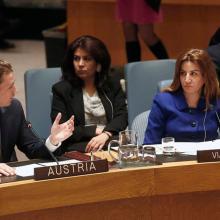northern iraq
IN 2019, I met with leaders from the Nahla Valley in Iraqi Kurdistan whose eight villages are both Muslim and Christian. Entire villages had been forced to evacuate when they were caught in the crossfire between rocket attacks launched from Turkey against Kurdish militias in northern Iraq. Children and community members were traumatized.
This February, border communities in northern Iraq were attacked again, this time by militants using Iranian-supplied weapons. Several rockets exploded in Irbil, the capital of Iraqi Kurdistan. One rocket hit the U.S.-led coalition military base, killing a civilian contractor from the Philippines and injuring at least six others. Many interpret the Irbil attack as a test of the Biden administration’s Iran policy, which seeks to revive the nuclear deal scrapped under the previous U.S. administration. President Joe Biden retaliated with airstrikes targeting Iranian-backed militias on the border in Syria—killing 22 people. The minority communities, including Christians, living in the Kurdish regions of neighboring Turkey, Syria, and Iraq continue to be caught in the middle as geopolitical conflicts escalate.
As the only female Yazidi in the Iraqi Parliament, Dakhil fought tirelessly for international assistance to stop the violence, including sexual slavery, targeting her beleaguered people.
Now she has been awarded the Lantos Human Rights Prize in Washington, D.C. But she is unlikely to make the ceremony on Feb. 8, since President Donald Trump banned all travelers from Iraq.

